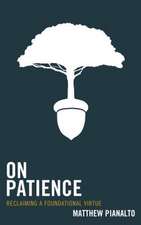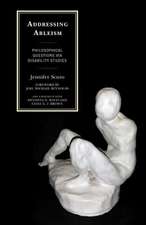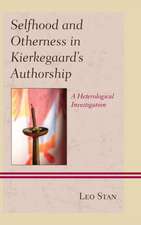The Ethics of Giacomo Leopardi: A Philosophy for the Environmental Crisis
Autor Alice Gibsonen Limba Engleză Hardback – 15 noi 2023
Preț: 509.28 lei
Preț vechi: 730.55 lei
-30% Nou
Puncte Express: 764
Preț estimativ în valută:
97.46€ • 101.38$ • 80.46£
97.46€ • 101.38$ • 80.46£
Carte tipărită la comandă
Livrare economică 15-29 aprilie
Preluare comenzi: 021 569.72.76
Specificații
ISBN-13: 9781350298644
ISBN-10: 1350298646
Pagini: 256
Dimensiuni: 138 x 216 x 25 mm
Greutate: 0.44 kg
Editura: Bloomsbury Publishing
Colecția Bloomsbury Academic
Locul publicării:London, United Kingdom
ISBN-10: 1350298646
Pagini: 256
Dimensiuni: 138 x 216 x 25 mm
Greutate: 0.44 kg
Editura: Bloomsbury Publishing
Colecția Bloomsbury Academic
Locul publicării:London, United Kingdom
Caracteristici
Against the prevalent image of Leopardi as a pessimistic, nihilist thinker, this book uncovers the ethics of solidarity, compassion and community that underpins his work
Notă biografică
Alice Gibson completed a PhD in Philosophy at the Centre for Research in Modern European Philosophy, Kingston University, UK. She is currently Research Publications Officer at London School of Hygiene and Tropical Medicine, UK.
Cuprins
IntroductionPart I: Vices, Trifles, and Illusions 1. Problematizing Works 2. Barbarous Times in the Zibaldone 3. The General Spirit of the Age in the Operette 4. Exonerating Humanity Part II: Dreams and Vision 5. A Philosophy that Aims to Cure in the Canti 6. The Property of Works of Genius: Should Laughter or Pity Prevail? 7. The Limits of Leopardi's Thought 8. Resignifying Leopardi Today Conclusion: Planetary Solidarity Bibliography Index
Recenzii
This is a beautifully written book which, contrary to readings of Giacomo Leopardi which portray him as a pessimist, undertakes the task of reconstructing his ethical project by highlighting the affirmative politics of sharing, flourishing and sociality that underpins his work. In doing so, this research adopts a new vantage point for looking both at key ethical categories and our human fragility as a response to the theoretical and political challenges imposed by the environmental catastrophe that characterizes our time.
An excellent contribution to Leopardi Studies, and to the current debate over ecological theory. Gibson eloquently and passionately assesses Leopardi's discourse over nature, human neglect and irresponsibility in the modern world, and convincingly declares it as profoundly poignant and relevant for our present and future.
Gibson makes a compelling case for Leopardi's prescient critique of the illusion of human planetary power informing both anthropocene discourse and its environmentalist critique. Her Leopardi advocates an ethics of human solidarity in fragility in the face of a planet indifferent to its survival or extinction. Her book demands a fundamental rethinking of the assumptions informing our environmental ethics and activism.
An excellent contribution to Leopardi Studies, and to the current debate over ecological theory. Gibson eloquently and passionately assesses Leopardi's discourse over nature, human neglect and irresponsibility in the modern world, and convincingly declares it as profoundly poignant and relevant for our present and future.
Gibson makes a compelling case for Leopardi's prescient critique of the illusion of human planetary power informing both anthropocene discourse and its environmentalist critique. Her Leopardi advocates an ethics of human solidarity in fragility in the face of a planet indifferent to its survival or extinction. Her book demands a fundamental rethinking of the assumptions informing our environmental ethics and activism.

















